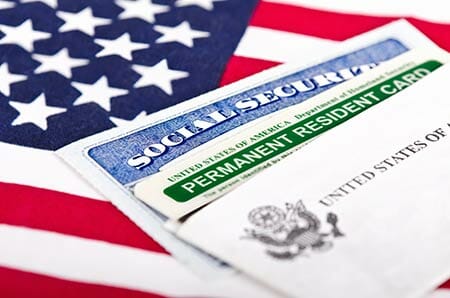An Immigration Fraud Defense Lawyer Can Fight for Your Rights
Using fraud or willful misrepresentation to try to be admitted into the U.S. is a mistake that can have major consequences. The same goes for fraudulent acts such as lying on immigration documents for entry, entering into a fraudulent marriage solely for immigration reasons, or fraudulently providing another person with invalid immigration services. These attempts are likely to backfire, and you may be deemed inadmissible into the U.S. and face federal criminal charges and other serious penalties. It’s best to be as truthful as possible, hope for the best and not put yourself in a position where you need to explain things that aren’t true and why you said them. If you’re in Kentucky and feel you need to resort to stating things that aren’t true or you have already been charged with fraud, you should get help from an experienced Lexington immigration lawyer.
The Kentucky immigration lawyers at Carman Fullerton, PLLC help people who are considering fraud or who are faced with removal for fraudulent behavior. We know the laws, the system, and the best approach to take to fight for your rights and get you on the path to citizenship. We are aware of how important it is for families to be able to stay together and be allowed to live and work in the United States, and we will aggressively fight for you.
We offer a free consultation to discuss the facts of your individual situation and answer your questions about Kentucky immigration laws. Call us today to see how we can help at 859-971-0060.
Types of Immigration Fraud and Misrepresentation
Our Immigration Fraud Attorneys Deal With a Wide Range of Immigration Fraud Crimes
“Immigration fraud” is a term that encompasses many different types of fraudulent misconduct or deceptive acts related to any part of the immigration process. An applicant can be found to be inadmissible if he or she gets a benefit through fraud or willful misrepresentation. These are two different things under immigration law, but they have common elements. A determination that a person is inadmissible due to willful misrepresentation requires a finding that the applicant willfully misrepresented a material fact.
The following are the most common types of immigration fraud that can lead to prosecution by the federal government:
- Benefits, identity or document fraud – This may involve lying on an immigration form, altering or counterfeiting, or using a false identity on an immigration document or visa application to evade immigration laws. According to U.S. Code (8 USC 1324c), it is unlawful to try to satisfy immigration requirements if you:
-
- knowingly forge, counterfeit, alter, or falsely make any document
- use, attempt to use, possess, obtain, accept, or receive or to provide any forged, counterfeit, altered, or falsely made document, or any document lawfully issued to another person
- Marriage fraud – This involves entering into a fraudulent marriage to obtain citizenship or to help someone else gain entry into the country, or to evade U.S. immigration law and obtain a green card. The authorities may investigate suspected marriage fraud by making unannounced visits to the couple’s home, requesting convincing documentation of a legitimate marriage, or conducting intrusive interviews.
- Immigration Services Fraud – This involves fraudulently representing yourself as an immigration attorney or as otherwise qualified to offer immigration-related services or legal advice to immigrants. This often occurs when a notary public, known as “notarios publicos,” illegally represents themself as qualified to handle the immigration process. Even if an immigrant is innocent, when an unlicensed attorney or unqualified notario misrepresents facts or provides false documentation, the immigrant may be accused of immigration fraud and face deportation.
- Committing forgery or perjury or making false statements about immigration status to obtain employment or other benefits.
Immigration Fraud Penalties You May Face
How Long do You go to Jail for Immigration Fraud?
Immigration fraud is a serious federal offense with potentially long-lasting and criminal penalties that depend on the circumstances of the case.
Examples of penalties include:
Fraudulent marriage – For the purpose of obtaining lawful permanent residence status as a non-citizen, (8 U.S.C. § 1325(c)), carries penalties of up to five years in prison, a fine of up to $250,000, or both. If convicted, you can be deported and denied re-entry into the United States.
Fraud and misuse of visas, permits, and other documents — Whoever uses . . .
- (1) an identification document, knowing (or having reason to know) that the document was not issued lawfully for the use of the possessor, or that the document is false, or
- (2) a false attestation,
shall be fined under this title, imprisoned not more than 5 years, or both.
Under 18 U.S.C. § 1546, punishment may be a fine, up to 5 years in prison, or both if the fraud is for the purpose of satisfying a requirement of section 274A(b) of the Immigration and Nationality Act. If the crime is committed to facilitate an act of international terrorism, you can receive 25 years in prison. If the crime is committed to facilitate a drug trafficking crime, penalties are up to 20 years in prison. Non-citizens who are convicted will lose their legal status and be ordered to leave the country.
Immigration Fraud Defenses Our Attorneys May Use
it is not uncommon for people to be wrongfully accused and convicted of immigration fraud and receive harsh penalties and loss of status. With so much at stake, it’s important to seek legal guidance from a knowledgeable immigration fraud defense attorney.
If you have been accused of an immigration fraud crime, you should know that the government has the burden of proving that you are guilty beyond a reasonable doubt. For a conviction, the immigration officer must find all of these things to be true:
- The person obtained, or tried to obtain, a benefit available under immigration law.
- The person made a false statement.
- It was willfully made.
- It was material or relevant to the application.
- It was made to a U.S. government official.
If the above are shown, the person would be inadmissible due to willful misrepresentation. Evidence of intent to deceive isn’t necessary. Inadmissibility because of fraud must be based on a finding of all the above elements plus an intent to deceive. If the applicant wasn’t able to get the benefit, he or she can be deemed inadmissible for trying to obtain an immigration benefit by fraud.
Even though an applicant has been found to be inadmissible due to fraud or willful misrepresentation, he or she may be able to get a waiver allowing them to enter the country or get an immigration benefit anyway if:
- This would provide humanitarian relief and promote family unity
- The person would be seen as deserving of a waiver due to positive factors outweighing the fraud, willful misrepresentation or other negative factors.
A waiver is available only to applicants who can show an extreme hardship to one of the following:
- A U.S. citizen parent or spouse
- A lawful permanent resident (LPR) parent or spouse
- A citizen fiancé/fiancée
- If the person is covered by the Violence Against Women Act (VAWA), the VAWA self-petitioner, or his or her citizen, LPR or qualified alien parent or child.
Whether or not a waiver of inadmissibility based on fraud or willful misrepresentation is available depends on the immigration benefit being sought. A waiver may be available for those seeking one of these:
- An immigrant visa or adjustment of status as part of a family-based petition or as a VAWA self-petitioner
- An immigrant visa or adjustment of status due to an employment-based petition
- A nonimmigrant K visa (fiancé/fiancée of a U.S. citizen and their accompanying minor children, foreign spouses or step-children of U.S. citizens)
- A nonimmigrant V visa (spouses and unmarried children under age 21, or step-children of an LPR).
Our Attorneys Know Possible Defenses to Fraud
Depending on the circumstances, our lawyers may be able to use some of the following defenses in an immigration fraud case:
- Proper documentation – You can produce the proper documentation for the issue.
- Lack of knowledge or intent – You did not knowingly and purposefully intend to commit immigration fraud, and you did not know that your actions were fraud.
- Legal marriage – Your marriage is one that is legal and valid.
- Duress or entrapment – You committed the immigration fraud crime under duress, or you were induced to commit the crime by police or other law enforcement agent.
- Illegal search and seizure – Evidence against you was obtained illegally.
- Insufficient evidence – The prosecution has insufficient evidence to prove the crime beyond a reasonable doubt.
Our immigration attorneys will explore every option to build your defense. Call us today at 859-971-0060.
Call Our Immigration Attorneys for Help
If you live in Kentucky and may be in a situation where you may have committed fraud and you have questions about what you should do, we are here to help.
Carman Fullerton, PLLC is an immigration law firm based in Lexington, Kentucky, that provides legal representation to clients throughout the state who need immigration services. Whether dealing with U.S. Immigration and Customs Enforcement (ICE) issues or other legal problems, including accidents, criminal charges, and marital issues, new and potential citizens have a Spanish-speaking friend in Dan Carman and the Carman Fullerton team. We work to protect your rights and resolve your case with the best results possible.
Delaying can only make your situation worse, so call us today at 859-971-0060 so we can discuss the legal process, the applicable laws, and how we can help you.

Attorney Kirby J. Fullerton
Mr. Fullerton’s practice is focused on immigration law. He speaks Spanish, and represents clients in cases before the immigration courts and the Board of Immigration Appeals. He began his career practicing criminal defense, and understands how matters in criminal courts can affect a client’s immigration status. [Attorney Bio]




